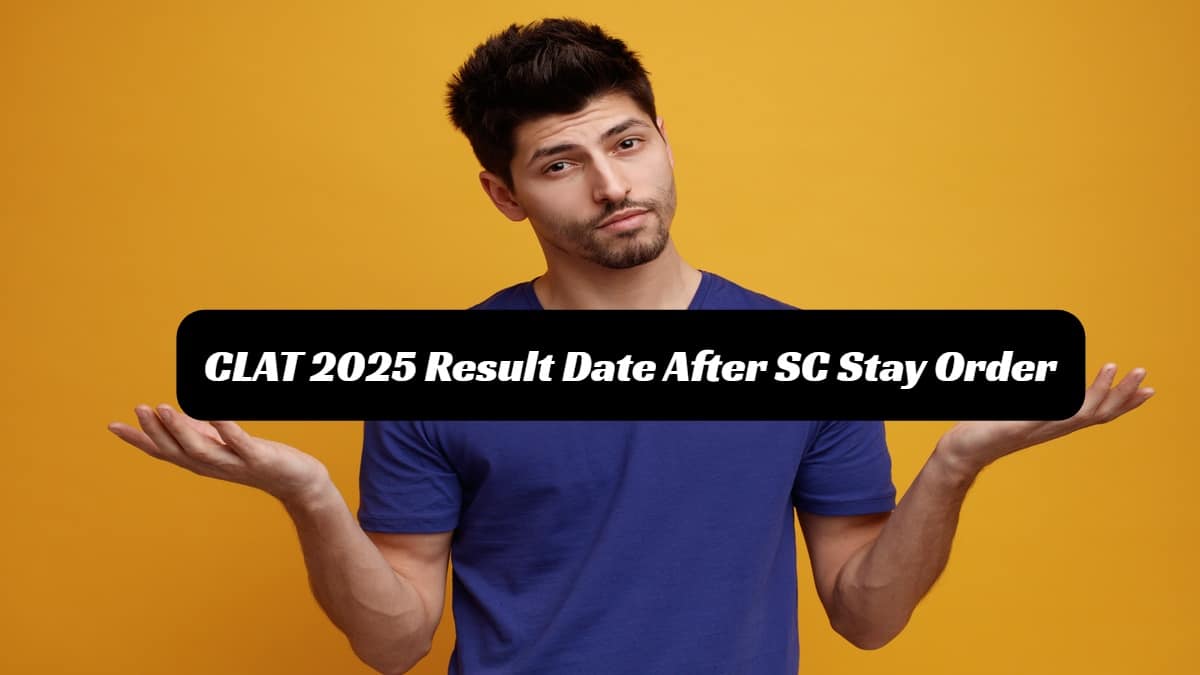CLAT 2025 SC Stay Order: When Will Consortium of NLUs Declare Revised Result? Check Dates
In the hearing conducted on April 30, the Supreme Court stayed the Delhi HC judgement delivered on April 23 that directed the Consortium of National Law Universities to publish CLAT 2025 revised result within four weeks. The SC stay order was passed by a division bench presided by Justice B R Gavai and Justice AG Masih while hearing a petition filed by candidate Siddhi Sandeep Ladda. The Consortium of NLUs has now notified that the next SC hearing in the matter will be conducted on May 5, 2025. After the HC judgement, candidates were hopeful that the revised result for CLAT UG will finally be declared. However, with the new SC order, the wait for the CLAT 2025 final result will prolong further. In this article, find out when the Consortium of NLUs is expected to declare the CLAT 2025 result.

The CLAT PG hearing is also scheduled to be conducted on May 2 in the Delhi HC. It remains to be seen whether the HC goes ahead with the hearing and delivers the judgement for cases in CLAT PG exam.
What Does the CLAT 2025 SC Stay Order Say?
The SC verdict puts a stay on the earlier HC order passed on April 23 to publish the revised CLAT result. The stay order issued by the top court is in response to a Special Leave Petition (SLP) filed by Siddhi Sandeep Ladda who had attempted Set A question paper in CLAT 2025.
The candidate had secured a rank of AIR 22 as per the earlier result declared on December 7, 2024. She argues that the Delhi HC judgement puts candidates who attempted Set A at a disadvantage compared to candidates who attempted Set B,C and D.
It is to be noted that the Delhi HC judgement had ordered the revision of the CLAT 2025 answer key for four questions. In one of those questions,namely Q.no 116, candidates who attempted Set B,C and D were given the benefit of erroneous numbering of questions while candidates who attempted Set A did not get the benefit.
CLAT 2025 SC Hearing Next Date
The case will tentatively be listed for hearing again on May 5, 2025. The details are given below.
CLAT 2025 SC Case Details
Case Diary Number | Parties | Advocate Name | Next Listing Date (tentative) |
22324/2025 | Siddhi Sandeep Ladda Vs Consortium of NLUs and Aditya Singh | Soumik Ghosal (Petitioner advocate) | May 5, 2025 |
When Will Consortium Declare Revised Result?
The SC stay order now prohibits the Consortium of NLUs from publishing the CLAT 2025 revised result. The next hearing in the SC case is scheduled to be conducted on May 5. It remains to be seen whether the consortium will challenge the SC order. However, it looks certain that the CLAT results will be further delayed due to the new case. The CLAT 2025 counselling process will restart only once all the cases are resolved
CLAT 2025 Revised Result Date
Particulars | Details |
CLAT 2025 revised result release date | Second Week of May 2025 (tentative) |
Popular Courses and Specializations
Popular Degrees
List of colleges accepting CLAT
Browse Law Colleges by State
Questions related to CLAT
On Question asked by student community
Since you have not specified your category, I will answer for all categories. A CLAT rank of 38169 (typically 40-45 marks) makes admission to top NLUs difficult. For General candidates, chances are nil. Even for OBC, SC, and ST categories, admission is primarily possible only through state domicile quotas or
After the CLAT results are declared, candidates participate in a centralised online counselling process managed by the Consortium of NLUs. Eligible candidates register on the official portal, submit their NLU preference list , and pay a counselling fee. Seat allotment happens across multiple rounds based on rank, category, and preferences,
Hi, you can apply for admissions in Nirma University, NFSU Ahemdabad, Alliance, IPU University and affiliated instiutes (in case you are reserved category candidates), UPES Dehradun, BITS Law School etc.
Start preparing for CLAT by first understanding the exam pattern and syllabus, which includes English, Current Affairs, Legal Reasoning, Logical Reasoning, and Quantitative Techniques. Make a simple daily routine and begin with basics read newspapers regularly for current affairs, practice comprehension passages for English and legal sections, and solve basic
Hello,
With a CLAT AIR of 33599 and SC category rank of 2103, and being a Delhi domicile, your chances at IP University (GGSIPU) are moderate to good, especially in later counselling rounds.
Based on previous year trends, some IPU-affiliated law colleges have closed at higher SC category ranks, so
Start a career in Law. Admissions Open for LLB courses for
Among top 100 Universities Globally in the Times Higher Education (THE) Interdisciplinary Science Rankings 2026
Chandigarh University Admissions 2026
ApplyNAAC A+ Accredited | Among top 2% Universities Globally (QS World University Rankings 2026)
Manav Rachna University Law Admissions 2026
ApplyAdmissions open for B.A. LL.B. (Hons.), B.B.A. LL.B. (Hons.) and LL.B Program (3 Years) | School of Law, MRU ranked No. 1 in Law Schools of Excellence in India by GHRDC (2023)
RV University, Bangalore | Law Admissions 2026
ApplyExcellent curriculum; an impressive range of electives, besides core law courses. Up to 100% merit scholarship on a first-come, first-served basis
Unitedworld School of Law Admissions 2026
ApplyMoot Court | Mock trials | Legal Aid Clinic
SRM University, Chennai Law UG 2026
ApplyNAAC A++ Accredited | Ranked #11 by NIRF
